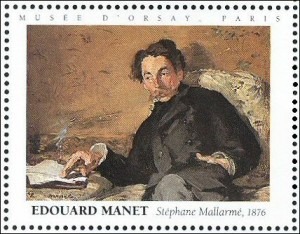 “Minors of the Majors” invites you to discover compositions by the great classical composers that for one reason or another have not reached the musical mainstream. Please enjoy, and keep listening!
“Minors of the Majors” invites you to discover compositions by the great classical composers that for one reason or another have not reached the musical mainstream. Please enjoy, and keep listening!
For Maurice Ravel, the poetry of the symbolist Stéphane Mallarmé represented a considerable intellectual challenge. He once remarked that the poet’s “unbound visions, yet precise in design, enclosed in a mystery of somber abstractions—an art where all the elements are so intimately bound up together that one cannot analyze, but only sense its effects.” It was as if, according to Ravel, “Mallarmé released unconscious daydreams from their prison.” Ravel had set his first Mallarmé poem “Sainte” to music in 1896, but when he heard Igor Stavinsky’s Trois poésies de la lyrique japonaise in 1913, he once again succumb to the allure of Mallarmé’s cryptic symbolist verses. Stravinsky explained that his instrumentation was derived from the score of Pierrot Lunaire, which Arnold Schoenberg had recently shown him in Berlin. Ravel did not know Schoenberg’s work, but he was eager to explore the coloristic possibilities of working with a chamber ensemble. Consisting of piccolo, flute, clarinet, bass clarinet, string quartet, and piano, the ensemble mirrors the dissociative imagery of three Mallarmé poems with increased angularity and dissonance. In fact, Ravel’s setting exploits a harmonic scheme that is not tonally oriented. “Soupir” (Sigh), which progresses from traditional tonality to a suggestion of atonality, follows the arched structure of a sigh with the voice rising to a subtle climax before descending in a long and sad release. In “Placet Futile” (Futile Petition), essentially a gentle and melancholy love song, angular vocal lines are delicately supported by chromatic harmonies. Ravel called his setting of “Surgi de la croupe et du bond” (Rising from the Crupper and Leap) “my strangest, if not my most hermetic.” Indeed, a sparse musical texture is punctured by bell-like octaves at structural points, and scholars have rightfully suggested that the setting adheres to genuine atonality.
Maurice Ravel: Trois Poèmes de Stéphane Mallarmé
1) Soupir: dedicated to Stravinsky.
Mon âme vers ton front où rêve, ô calme soeur,
Un automne jonché de taches de rousseur,
Et vers le ciel errant de ton oeil angélique
Monte, comme dans un jardin mélancolique,
Fidèle, un blanc jet d’eau soupire vers l’Azur!
— Vers l’azur attendri d’octobre pâle et pur
Qui mire aux grands bassins sa langueur infinie
Et laisse, sur l’eau morte où la fauve agonie
Des feuilles erre au vent et creuse un froid sillon,
Se trainer le soleil jaune d’un long rayon.
2) Placet Futile: dedicated to Florent Schmitt
Princesse! à jalouser le destin d’une Hébé
Qui point sur cette tasse au baiser de vos lèvres;
J’use mes feux mais n’ai rang discret que d’abbé
Et ne figurerai même nu sur le Sèvres.
Comme je ne suis pas ton bichon embarbé
Ni la pastille ni du rouge, ni jeux mièvres
Et que sur moi je sens ton regard clos tombé
Blonde dont les coiffeurs divins sont des orfèvres!
Nommez-nous… toi de qui tant de ris framboisés
Se joignent en troupeau d’agneaux apprivoisés
Chez tous broutant les voeux et bêlant aux délires,
Nommez-nous… pour qu’Amour ailé d’un éventail
M’y peigne flûte aux doigts endormant ce bercail,
Princesse, nommez-nous berger de vos sourires.
3) Surgi de la croupe et du bond: dedicated to Erik Satie
Surgi de la croupe et du bond
D’une verrerie éphémère
Sans fleurir la veillée amère
Le col ignoré s’interrompt.
Je crois bien que deux bouches n’ont
Bu, ni son amant ni ma mère,
Jamais à la même chimère,
Moi, sylphe de ce froid plafond!
Le pur vase d’aucun breuvage
Que l’inexhaustible veuvage
Agonise mais ne consent,
Naïf baiser des plus funèbres!
À rien expirer annonçant
Une rose dans les ténèbres.
You May Also Like
- Minors of the Majors
Anton Bruckner: String Quintet in F Major A man of humble origin, Anton Bruckner (1824-1896) retained his shy demeanour throughout his life. - Minors of the Majors
Georges Bizet: Chants du Rhin Unfortunately, Georges Bizet (1838-1875) did not live to see the unbridled success of his opera Carmen. - Minors of the Majors
Bedřich Smetana: Dreams A patriotic and nationalistic fervor, which had inundated virtually all aspects of European society, eventually led to the revolutions and subsequent unification of Germany and Italy around the middle of the nineteenth century. - Minors of the Majors
Giacomo Puccini: Pezzo per pianoforte Giacomo Puccini (1858-1924) famously wrote, “Holy God touched me with his little finger and said to me, write for the theater; take care, write only for the theater.”
More Anecdotes
- Bach Babies in Music
Regina Susanna Bach (1742-1809) Learn about Bach's youngest surviving child - Bach Babies in Music
Johanna Carolina Bach (1737-81) Discover how family and crisis intersected in Bach's world - Bach Babies in Music
Johann Christian Bach (1735-1782) From Soho to the royal court: Johann Christian Bach's London success story - A Tour of Boston, 1924
Vernon Duke’s Homage to Boston Listen to pianist Scott Dunn bring this musical postcard to life
